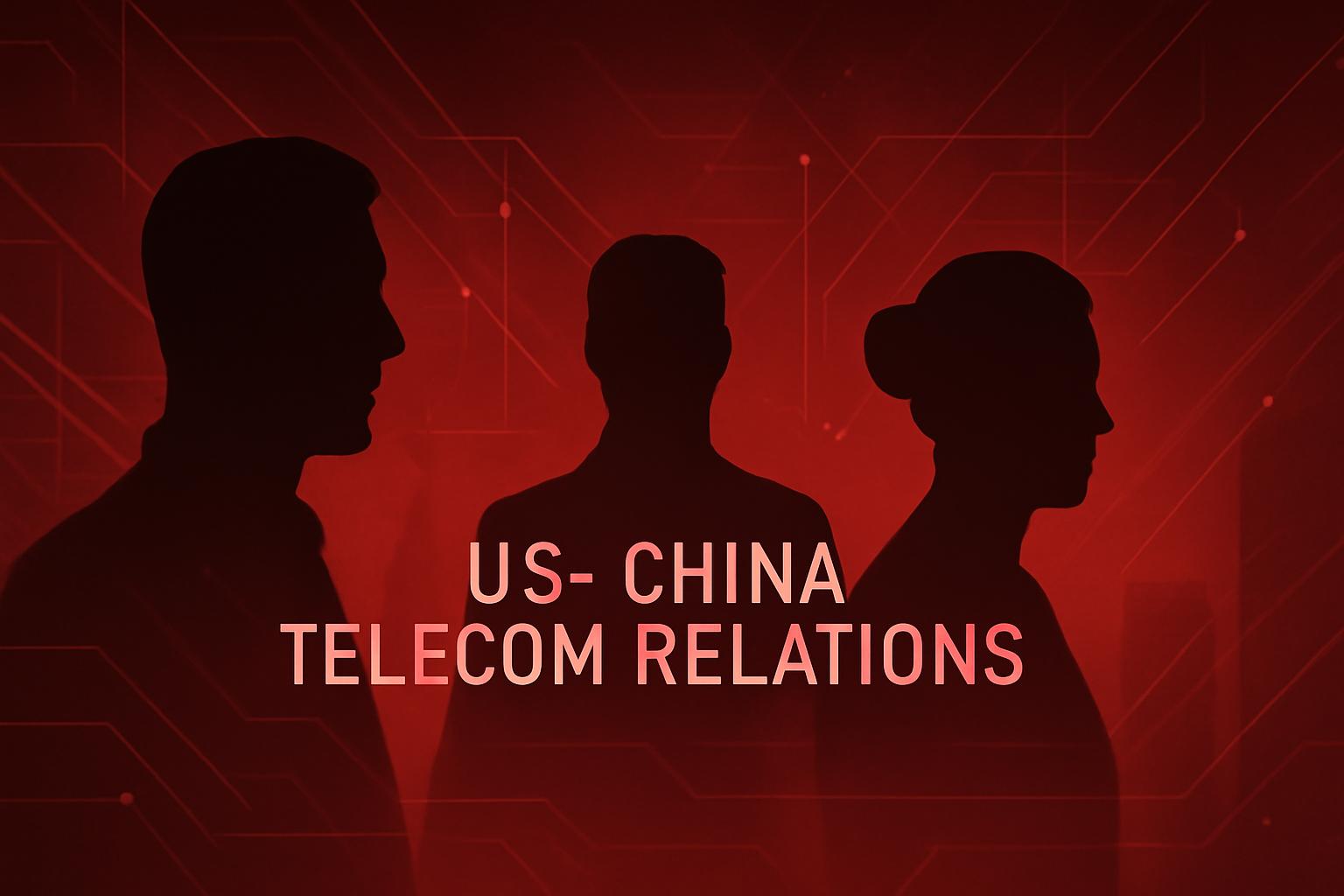The FCC’s move to potentially revoke HKT’s access to U.S. networks marks a significant escalation in the regulatory clampdown on foreign telecommunications firms with Chinese affiliations. This development reflects heightened geopolitical risk factors that investors and industry participants must monitor closely. !-- wp:paragraph -->
- Opportunities: U.S. telecom providers may benefit from reduced competition as Chinese-linked firms are excluded, potentially increasing market share.
- Risks: Heightened U.S.-China tensions could disrupt global telecom supply chains and investment flows.
- Companies with ties to Chinese state-owned enterprises face increased regulatory scrutiny and potential exclusion from U.S. markets.
- Hong Kong and mainland China businesses linked to international conglomerates could experience operational and reputational challenges amid geopolitical fallout.
FinOracleAI — Market View
The FCC’s move to potentially revoke HKT’s access to U.S. networks marks a significant escalation in the regulatory clampdown on foreign telecommunications firms with Chinese affiliations. This development reflects heightened geopolitical risk factors that investors and industry participants must monitor closely. !-- wp:paragraph -->- Opportunities: U.S. telecom providers may benefit from reduced competition as Chinese-linked firms are excluded, potentially increasing market share.
- Risks: Heightened U.S.-China tensions could disrupt global telecom supply chains and investment flows.
- Companies with ties to Chinese state-owned enterprises face increased regulatory scrutiny and potential exclusion from U.S. markets.
- Hong Kong and mainland China businesses linked to international conglomerates could experience operational and reputational challenges amid geopolitical fallout.
FinOracleAI — Market View
The FCC’s move to potentially revoke HKT’s access to U.S. networks marks a significant escalation in the regulatory clampdown on foreign telecommunications firms with Chinese affiliations. This development reflects heightened geopolitical risk factors that investors and industry participants must monitor closely. !-- wp:paragraph -->- Opportunities: U.S. telecom providers may benefit from reduced competition as Chinese-linked firms are excluded, potentially increasing market share.
- Risks: Heightened U.S.-China tensions could disrupt global telecom supply chains and investment flows.
- Companies with ties to Chinese state-owned enterprises face increased regulatory scrutiny and potential exclusion from U.S. markets.
- Hong Kong and mainland China businesses linked to international conglomerates could experience operational and reputational challenges amid geopolitical fallout.
FinOracleAI — Market View
The FCC’s move to potentially revoke HKT’s access to U.S. networks marks a significant escalation in the regulatory clampdown on foreign telecommunications firms with Chinese affiliations. This development reflects heightened geopolitical risk factors that investors and industry participants must monitor closely. !-- wp:paragraph -->- Opportunities: U.S. telecom providers may benefit from reduced competition as Chinese-linked firms are excluded, potentially increasing market share.
- Risks: Heightened U.S.-China tensions could disrupt global telecom supply chains and investment flows.
- Companies with ties to Chinese state-owned enterprises face increased regulatory scrutiny and potential exclusion from U.S. markets.
- Hong Kong and mainland China businesses linked to international conglomerates could experience operational and reputational challenges amid geopolitical fallout.
Context: U.S.-China Trade and Regulatory Tensions
PCCW is majority-owned by Hong Kong billionaire Richard Li, son of Li Ka-shing, whose business interests have increasingly become entangled in U.S.-China trade frictions. Li’s Pacific Century Group and related entities have faced regulatory challenges and stalled deals in mainland China amid rising geopolitical tensions. !-- wp:paragraph --> For example, Beijing reportedly instructed state-owned companies to suspend new business with Li’s conglomerates following a controversial ports deal with a BlackRock-led consortium, which Beijing opposed due to the exclusion of Chinese investors. !-- wp:paragraph --> The FCC’s action against HKT coincides with ongoing escalation in U.S. trade policy under President Donald Trump’s administration, intensifying scrutiny of Chinese-linked firms operating in critical infrastructure sectors. !-- wp:paragraph -->FinOracleAI — Market View
The FCC’s move to potentially revoke HKT’s access to U.S. networks marks a significant escalation in the regulatory clampdown on foreign telecommunications firms with Chinese affiliations. This development reflects heightened geopolitical risk factors that investors and industry participants must monitor closely. !-- wp:paragraph -->- Opportunities: U.S. telecom providers may benefit from reduced competition as Chinese-linked firms are excluded, potentially increasing market share.
- Risks: Heightened U.S.-China tensions could disrupt global telecom supply chains and investment flows.
- Companies with ties to Chinese state-owned enterprises face increased regulatory scrutiny and potential exclusion from U.S. markets.
- Hong Kong and mainland China businesses linked to international conglomerates could experience operational and reputational challenges amid geopolitical fallout.
Context: U.S.-China Trade and Regulatory Tensions
PCCW is majority-owned by Hong Kong billionaire Richard Li, son of Li Ka-shing, whose business interests have increasingly become entangled in U.S.-China trade frictions. Li’s Pacific Century Group and related entities have faced regulatory challenges and stalled deals in mainland China amid rising geopolitical tensions. !-- wp:paragraph --> For example, Beijing reportedly instructed state-owned companies to suspend new business with Li’s conglomerates following a controversial ports deal with a BlackRock-led consortium, which Beijing opposed due to the exclusion of Chinese investors. !-- wp:paragraph --> The FCC’s action against HKT coincides with ongoing escalation in U.S. trade policy under President Donald Trump’s administration, intensifying scrutiny of Chinese-linked firms operating in critical infrastructure sectors. !-- wp:paragraph -->FinOracleAI — Market View
The FCC’s move to potentially revoke HKT’s access to U.S. networks marks a significant escalation in the regulatory clampdown on foreign telecommunications firms with Chinese affiliations. This development reflects heightened geopolitical risk factors that investors and industry participants must monitor closely. !-- wp:paragraph -->- Opportunities: U.S. telecom providers may benefit from reduced competition as Chinese-linked firms are excluded, potentially increasing market share.
- Risks: Heightened U.S.-China tensions could disrupt global telecom supply chains and investment flows.
- Companies with ties to Chinese state-owned enterprises face increased regulatory scrutiny and potential exclusion from U.S. markets.
- Hong Kong and mainland China businesses linked to international conglomerates could experience operational and reputational challenges amid geopolitical fallout.
Broader U.S. Efforts to Limit Chinese Influence
Under Chairman Brendan Carr’s leadership, the FCC has intensified measures to exclude Chinese state-linked companies, including China Telecom and Pacific Networks, from U.S. telecommunications infrastructure. This crackdown aligns with broader government initiatives to protect critical networks from foreign adversaries. !-- wp:paragraph --> Recently, the FCC also compelled major U.S. online retailers to remove millions of listings for banned Chinese electronics, highlighting an expansive approach to curbing Chinese technological influence. !-- wp:paragraph -->Context: U.S.-China Trade and Regulatory Tensions
PCCW is majority-owned by Hong Kong billionaire Richard Li, son of Li Ka-shing, whose business interests have increasingly become entangled in U.S.-China trade frictions. Li’s Pacific Century Group and related entities have faced regulatory challenges and stalled deals in mainland China amid rising geopolitical tensions. !-- wp:paragraph --> For example, Beijing reportedly instructed state-owned companies to suspend new business with Li’s conglomerates following a controversial ports deal with a BlackRock-led consortium, which Beijing opposed due to the exclusion of Chinese investors. !-- wp:paragraph --> The FCC’s action against HKT coincides with ongoing escalation in U.S. trade policy under President Donald Trump’s administration, intensifying scrutiny of Chinese-linked firms operating in critical infrastructure sectors. !-- wp:paragraph -->FinOracleAI — Market View
The FCC’s move to potentially revoke HKT’s access to U.S. networks marks a significant escalation in the regulatory clampdown on foreign telecommunications firms with Chinese affiliations. This development reflects heightened geopolitical risk factors that investors and industry participants must monitor closely. !-- wp:paragraph -->- Opportunities: U.S. telecom providers may benefit from reduced competition as Chinese-linked firms are excluded, potentially increasing market share.
- Risks: Heightened U.S.-China tensions could disrupt global telecom supply chains and investment flows.
- Companies with ties to Chinese state-owned enterprises face increased regulatory scrutiny and potential exclusion from U.S. markets.
- Hong Kong and mainland China businesses linked to international conglomerates could experience operational and reputational challenges amid geopolitical fallout.
Precedent: China Unicom’s U.S. Network Access Revoked
China Unicom, which holds an 18.4% stake in PCCW, lost its U.S. network access in 2022 due to similar national security concerns. This previous action sets a significant precedent for the FCC’s current stance against HKT. !-- wp:paragraph -->Broader U.S. Efforts to Limit Chinese Influence
Under Chairman Brendan Carr’s leadership, the FCC has intensified measures to exclude Chinese state-linked companies, including China Telecom and Pacific Networks, from U.S. telecommunications infrastructure. This crackdown aligns with broader government initiatives to protect critical networks from foreign adversaries. !-- wp:paragraph --> Recently, the FCC also compelled major U.S. online retailers to remove millions of listings for banned Chinese electronics, highlighting an expansive approach to curbing Chinese technological influence. !-- wp:paragraph -->Context: U.S.-China Trade and Regulatory Tensions
PCCW is majority-owned by Hong Kong billionaire Richard Li, son of Li Ka-shing, whose business interests have increasingly become entangled in U.S.-China trade frictions. Li’s Pacific Century Group and related entities have faced regulatory challenges and stalled deals in mainland China amid rising geopolitical tensions. !-- wp:paragraph --> For example, Beijing reportedly instructed state-owned companies to suspend new business with Li’s conglomerates following a controversial ports deal with a BlackRock-led consortium, which Beijing opposed due to the exclusion of Chinese investors. !-- wp:paragraph --> The FCC’s action against HKT coincides with ongoing escalation in U.S. trade policy under President Donald Trump’s administration, intensifying scrutiny of Chinese-linked firms operating in critical infrastructure sectors. !-- wp:paragraph -->FinOracleAI — Market View
The FCC’s move to potentially revoke HKT’s access to U.S. networks marks a significant escalation in the regulatory clampdown on foreign telecommunications firms with Chinese affiliations. This development reflects heightened geopolitical risk factors that investors and industry participants must monitor closely. !-- wp:paragraph -->- Opportunities: U.S. telecom providers may benefit from reduced competition as Chinese-linked firms are excluded, potentially increasing market share.
- Risks: Heightened U.S.-China tensions could disrupt global telecom supply chains and investment flows.
- Companies with ties to Chinese state-owned enterprises face increased regulatory scrutiny and potential exclusion from U.S. markets.
- Hong Kong and mainland China businesses linked to international conglomerates could experience operational and reputational challenges amid geopolitical fallout.
Precedent: China Unicom’s U.S. Network Access Revoked
China Unicom, which holds an 18.4% stake in PCCW, lost its U.S. network access in 2022 due to similar national security concerns. This previous action sets a significant precedent for the FCC’s current stance against HKT. !-- wp:paragraph -->Broader U.S. Efforts to Limit Chinese Influence
Under Chairman Brendan Carr’s leadership, the FCC has intensified measures to exclude Chinese state-linked companies, including China Telecom and Pacific Networks, from U.S. telecommunications infrastructure. This crackdown aligns with broader government initiatives to protect critical networks from foreign adversaries. !-- wp:paragraph --> Recently, the FCC also compelled major U.S. online retailers to remove millions of listings for banned Chinese electronics, highlighting an expansive approach to curbing Chinese technological influence. !-- wp:paragraph -->Context: U.S.-China Trade and Regulatory Tensions
PCCW is majority-owned by Hong Kong billionaire Richard Li, son of Li Ka-shing, whose business interests have increasingly become entangled in U.S.-China trade frictions. Li’s Pacific Century Group and related entities have faced regulatory challenges and stalled deals in mainland China amid rising geopolitical tensions. !-- wp:paragraph --> For example, Beijing reportedly instructed state-owned companies to suspend new business with Li’s conglomerates following a controversial ports deal with a BlackRock-led consortium, which Beijing opposed due to the exclusion of Chinese investors. !-- wp:paragraph --> The FCC’s action against HKT coincides with ongoing escalation in U.S. trade policy under President Donald Trump’s administration, intensifying scrutiny of Chinese-linked firms operating in critical infrastructure sectors. !-- wp:paragraph -->FinOracleAI — Market View
The FCC’s move to potentially revoke HKT’s access to U.S. networks marks a significant escalation in the regulatory clampdown on foreign telecommunications firms with Chinese affiliations. This development reflects heightened geopolitical risk factors that investors and industry participants must monitor closely. !-- wp:paragraph -->- Opportunities: U.S. telecom providers may benefit from reduced competition as Chinese-linked firms are excluded, potentially increasing market share.
- Risks: Heightened U.S.-China tensions could disrupt global telecom supply chains and investment flows.
- Companies with ties to Chinese state-owned enterprises face increased regulatory scrutiny and potential exclusion from U.S. markets.
- Hong Kong and mainland China businesses linked to international conglomerates could experience operational and reputational challenges amid geopolitical fallout.
“The FCC’s action on HKT today is an appropriate step towards ensuring the safety and integrity of our communications networks,” said FCC Chairman Brendan Carr. “The FCC will continue to safeguard America’s networks against penetration from foreign adversaries, like China.”
Market Reaction and Share Price Impact
Following the announcement, shares of HKT listed in Hong Kong fell more than 5%, while PCCW’s shares declined by 3.6% in Thursday trading, reflecting investor concerns over the potential loss of U.S. market access. !-- wp:paragraph --> According to their 2024 annual reports, HKT and PCCW generate approximately 13% of their revenue from regions outside Greater China and Singapore, with HKT accounting for nearly 90% of the group’s total revenue. !-- wp:paragraph -->Precedent: China Unicom’s U.S. Network Access Revoked
China Unicom, which holds an 18.4% stake in PCCW, lost its U.S. network access in 2022 due to similar national security concerns. This previous action sets a significant precedent for the FCC’s current stance against HKT. !-- wp:paragraph -->Broader U.S. Efforts to Limit Chinese Influence
Under Chairman Brendan Carr’s leadership, the FCC has intensified measures to exclude Chinese state-linked companies, including China Telecom and Pacific Networks, from U.S. telecommunications infrastructure. This crackdown aligns with broader government initiatives to protect critical networks from foreign adversaries. !-- wp:paragraph --> Recently, the FCC also compelled major U.S. online retailers to remove millions of listings for banned Chinese electronics, highlighting an expansive approach to curbing Chinese technological influence. !-- wp:paragraph -->Context: U.S.-China Trade and Regulatory Tensions
PCCW is majority-owned by Hong Kong billionaire Richard Li, son of Li Ka-shing, whose business interests have increasingly become entangled in U.S.-China trade frictions. Li’s Pacific Century Group and related entities have faced regulatory challenges and stalled deals in mainland China amid rising geopolitical tensions. !-- wp:paragraph --> For example, Beijing reportedly instructed state-owned companies to suspend new business with Li’s conglomerates following a controversial ports deal with a BlackRock-led consortium, which Beijing opposed due to the exclusion of Chinese investors. !-- wp:paragraph --> The FCC’s action against HKT coincides with ongoing escalation in U.S. trade policy under President Donald Trump’s administration, intensifying scrutiny of Chinese-linked firms operating in critical infrastructure sectors. !-- wp:paragraph -->FinOracleAI — Market View
The FCC’s move to potentially revoke HKT’s access to U.S. networks marks a significant escalation in the regulatory clampdown on foreign telecommunications firms with Chinese affiliations. This development reflects heightened geopolitical risk factors that investors and industry participants must monitor closely. !-- wp:paragraph -->- Opportunities: U.S. telecom providers may benefit from reduced competition as Chinese-linked firms are excluded, potentially increasing market share.
- Risks: Heightened U.S.-China tensions could disrupt global telecom supply chains and investment flows.
- Companies with ties to Chinese state-owned enterprises face increased regulatory scrutiny and potential exclusion from U.S. markets.
- Hong Kong and mainland China businesses linked to international conglomerates could experience operational and reputational challenges amid geopolitical fallout.
“The FCC’s action on HKT today is an appropriate step towards ensuring the safety and integrity of our communications networks,” said FCC Chairman Brendan Carr. “The FCC will continue to safeguard America’s networks against penetration from foreign adversaries, like China.”
Market Reaction and Share Price Impact
Following the announcement, shares of HKT listed in Hong Kong fell more than 5%, while PCCW’s shares declined by 3.6% in Thursday trading, reflecting investor concerns over the potential loss of U.S. market access. !-- wp:paragraph --> According to their 2024 annual reports, HKT and PCCW generate approximately 13% of their revenue from regions outside Greater China and Singapore, with HKT accounting for nearly 90% of the group’s total revenue. !-- wp:paragraph -->Precedent: China Unicom’s U.S. Network Access Revoked
China Unicom, which holds an 18.4% stake in PCCW, lost its U.S. network access in 2022 due to similar national security concerns. This previous action sets a significant precedent for the FCC’s current stance against HKT. !-- wp:paragraph -->Broader U.S. Efforts to Limit Chinese Influence
Under Chairman Brendan Carr’s leadership, the FCC has intensified measures to exclude Chinese state-linked companies, including China Telecom and Pacific Networks, from U.S. telecommunications infrastructure. This crackdown aligns with broader government initiatives to protect critical networks from foreign adversaries. !-- wp:paragraph --> Recently, the FCC also compelled major U.S. online retailers to remove millions of listings for banned Chinese electronics, highlighting an expansive approach to curbing Chinese technological influence. !-- wp:paragraph -->Context: U.S.-China Trade and Regulatory Tensions
PCCW is majority-owned by Hong Kong billionaire Richard Li, son of Li Ka-shing, whose business interests have increasingly become entangled in U.S.-China trade frictions. Li’s Pacific Century Group and related entities have faced regulatory challenges and stalled deals in mainland China amid rising geopolitical tensions. !-- wp:paragraph --> For example, Beijing reportedly instructed state-owned companies to suspend new business with Li’s conglomerates following a controversial ports deal with a BlackRock-led consortium, which Beijing opposed due to the exclusion of Chinese investors. !-- wp:paragraph --> The FCC’s action against HKT coincides with ongoing escalation in U.S. trade policy under President Donald Trump’s administration, intensifying scrutiny of Chinese-linked firms operating in critical infrastructure sectors. !-- wp:paragraph -->FinOracleAI — Market View
The FCC’s move to potentially revoke HKT’s access to U.S. networks marks a significant escalation in the regulatory clampdown on foreign telecommunications firms with Chinese affiliations. This development reflects heightened geopolitical risk factors that investors and industry participants must monitor closely. !-- wp:paragraph -->- Opportunities: U.S. telecom providers may benefit from reduced competition as Chinese-linked firms are excluded, potentially increasing market share.
- Risks: Heightened U.S.-China tensions could disrupt global telecom supply chains and investment flows.
- Companies with ties to Chinese state-owned enterprises face increased regulatory scrutiny and potential exclusion from U.S. markets.
- Hong Kong and mainland China businesses linked to international conglomerates could experience operational and reputational challenges amid geopolitical fallout.
FCC Initiates Proceedings to Block HKT from U.S. Networks
The U.S. Federal Communications Commission (FCC) announced on Wednesday it has opened proceedings that could bar HKT Trust and HKT Ltd, subsidiaries of Hong Kong-based telecommunications giant PCCW, from interconnecting with American networks. The move underscores growing national security concerns related to the company’s ties with China. !-- wp:paragraph --> The FCC has formally requested HKT to justify why its authorizations allowing direct call and data exchanges with U.S. carriers should not be revoked, signaling a potential revocation of its current network access privileges. !-- wp:paragraph -->“The FCC’s action on HKT today is an appropriate step towards ensuring the safety and integrity of our communications networks,” said FCC Chairman Brendan Carr. “The FCC will continue to safeguard America’s networks against penetration from foreign adversaries, like China.”
Market Reaction and Share Price Impact
Following the announcement, shares of HKT listed in Hong Kong fell more than 5%, while PCCW’s shares declined by 3.6% in Thursday trading, reflecting investor concerns over the potential loss of U.S. market access. !-- wp:paragraph --> According to their 2024 annual reports, HKT and PCCW generate approximately 13% of their revenue from regions outside Greater China and Singapore, with HKT accounting for nearly 90% of the group’s total revenue. !-- wp:paragraph -->Precedent: China Unicom’s U.S. Network Access Revoked
China Unicom, which holds an 18.4% stake in PCCW, lost its U.S. network access in 2022 due to similar national security concerns. This previous action sets a significant precedent for the FCC’s current stance against HKT. !-- wp:paragraph -->Broader U.S. Efforts to Limit Chinese Influence
Under Chairman Brendan Carr’s leadership, the FCC has intensified measures to exclude Chinese state-linked companies, including China Telecom and Pacific Networks, from U.S. telecommunications infrastructure. This crackdown aligns with broader government initiatives to protect critical networks from foreign adversaries. !-- wp:paragraph --> Recently, the FCC also compelled major U.S. online retailers to remove millions of listings for banned Chinese electronics, highlighting an expansive approach to curbing Chinese technological influence. !-- wp:paragraph -->Context: U.S.-China Trade and Regulatory Tensions
PCCW is majority-owned by Hong Kong billionaire Richard Li, son of Li Ka-shing, whose business interests have increasingly become entangled in U.S.-China trade frictions. Li’s Pacific Century Group and related entities have faced regulatory challenges and stalled deals in mainland China amid rising geopolitical tensions. !-- wp:paragraph --> For example, Beijing reportedly instructed state-owned companies to suspend new business with Li’s conglomerates following a controversial ports deal with a BlackRock-led consortium, which Beijing opposed due to the exclusion of Chinese investors. !-- wp:paragraph --> The FCC’s action against HKT coincides with ongoing escalation in U.S. trade policy under President Donald Trump’s administration, intensifying scrutiny of Chinese-linked firms operating in critical infrastructure sectors. !-- wp:paragraph -->FinOracleAI — Market View
The FCC’s move to potentially revoke HKT’s access to U.S. networks marks a significant escalation in the regulatory clampdown on foreign telecommunications firms with Chinese affiliations. This development reflects heightened geopolitical risk factors that investors and industry participants must monitor closely. !-- wp:paragraph -->- Opportunities: U.S. telecom providers may benefit from reduced competition as Chinese-linked firms are excluded, potentially increasing market share.
- Risks: Heightened U.S.-China tensions could disrupt global telecom supply chains and investment flows.
- Companies with ties to Chinese state-owned enterprises face increased regulatory scrutiny and potential exclusion from U.S. markets.
- Hong Kong and mainland China businesses linked to international conglomerates could experience operational and reputational challenges amid geopolitical fallout.













